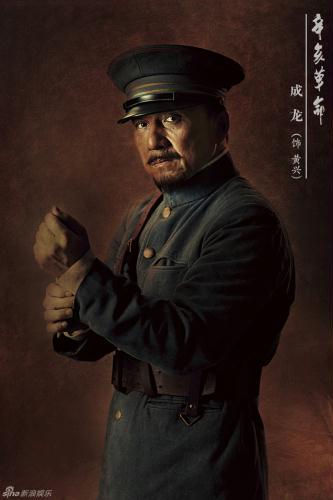Jackie Chan plays real-life hero in '1911'
 0 Comment(s)
0 Comment(s) Print
Print E-mail
CRI, September 30, 2011
E-mail
CRI, September 30, 2011
|
|
|
Jackie Chan plays real-life hero in "1911 Revolution" [Photo: cntv.cn] |
|
|
|
Jackie Chan plays real-life hero in "1911 Revolution" [Photo: sina.com] |
Related reading:
Bernardo Bertolucci told the story of The Last Emperor in 1987, but now Chinese filmmakers are celebrating the 1911 revolution that ended the corrupt Qing Dynasty and ushered China into the modern age from their own perspective.
In 1911, Jackie Chan stars as a soldier who reluctantly takes up arms against the royal family, and Winston Chou (Ang Lee's The Wedding Banquet) plays Chinese nationalist hero Sun Yat-sen. The trailer feels like a Chinese version of Pearl Harbor, what with all the explosions and blatant flag-waving.
Story of 1911 Revolution
China, 1907. As she is led through the streets en route to her execution, revolutionary Qiu Jin (Ning Jing) dreams of a fairer China and recalls the struggle of the Tongmenghui (Chinese Revolutionary Alliance), led by Sun Yat-sen (Winston Chao), to end imperial rule by the Manchu Qing government. In late 1910 Sun — along with Tongmenghui colleagues including Sun's deputy, the military-trained Huang Xing, aka Huang Keqiang (Jackie Chan), and his partner Xu Zonghan (Li Bingbing) — meet in Malaysia to plan the Huanghuagang Uprising in Guangzhou.
The uprising begins on on 27 April 1911 by attacking the Governor's Office but fails due to lack of ammunition, leading to the deaths of 72 revolutionaries. On 10 October in Hubei province, the Wuchang Uprising, initiated by disaffected Qing officer Zhang Zhenwu (Jaycee Chan), takes place and other provinces start to secede as a provisional government is formed in Nanjing under Sun. Empress Dowager Longyu (Joan Chen) orders Qing commander-in-chief Yuan Shikai (Sun Chun) to suppress the uprising, leading to a series of bloody battles in central China. Yuan himself is dubious about the need for war as a means of further shoring up the failing Qing dynasty.
In London, Sun persuades the key western powers to no longer agree to a £6 million load to the Qing government. As the fighting rages on, revolutionary army leaders Huang and Li Yuanhong (Jiang Wu) withdraw to the Yangtze River to gather their strength. Finally, after negotiations led by Tang Shaoyi (Xie Gang) and Wu Tingfang (Ye Daying), a republican form of government is agreed on, with 18 provinces declaring themselves in favour of democratic elections. To Yuan's annoyance, Sun becomes the country's first elected president; but to everyone's surprise, Sun agrees to step down and hand over the position to Yuan if the latter can persuade the last Qing ruler, boy emperor Puyi, to abdicate.








Go to Forum >>0 Comment(s)